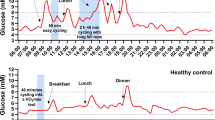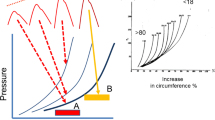Abstract.
We investigated the changes in the cardiovascular system [resting blood pressure (BP) and heart rate (HR), measured by means of a 24-h ambulatory BP and a holter-electrocardiogram (ECG)], glycemic parameters, and lipid metabolism of subjects suffering from metabolic syndrome during a 3-week sojourn at 1,700 m in the Austrian Alps. A total of 22 male subjects with metabolic syndrome were selected. Baseline investigations were performed at Innsbruck (500 m above sea level). During the 3-week altitude stay the participants simulated a holiday with moderate sports activities. Examinations were performed on days 1, 4, 9, and 19. After returning to Innsbruck, post-altitude examinations were conducted after 7–10 days and 6–7 weeks, respectively. The 24-h ambulatory BP and holter ECG revealed a decrease in average HR, BP, and rate pressure product (RPP: systolic blood pressure × HR) after 3 weeks of altitude exposure. In some patients, an increase in premature ventricular beats was observed at the end compared to the beginning of the exposure to moderate altitude. The ECG revealed no ischemic ST-segment changes. Maximal physical capacity as measured by symptom-limited maximal cycle ergometry tests remained unchanged during the study. Six weeks after the altitude exposure the blood pressure increased again and returned to pretest levels. The Homeostasis Model Assessment index, which is a measure of insulin resistance, decreased significantly and glucose concentrations obtained after an oral glucose tolerance test were significantly lower after the stay at altitude compared to the basal values. We conclude that after a 3-week exposure to moderate altitude, patients with metabolic syndrome (1) tolerated their sojourn without any physical problems, (2) exhibited short-term favorable effects on the cardiovascular system, and (3) had significant improvements in glycemic parameters that were paralleled by a significant increase in high-density-lipoprotein-cholesterol.
Similar content being viewed by others
Author information
Authors and Affiliations
Additional information
Electronic Publication
Rights and permissions
About this article
Cite this article
Schobersberger, W., Schmid, P., Lechleitner, M. et al. Austrian Moderate Altitude Study 2000 (AMAS 2000). The effects of moderate altitude (1,700 m) on cardiovascular and metabolic variables in patients with metabolic syndrome. Eur J Appl Physiol 88, 506–514 (2003). https://doi.org/10.1007/s00421-002-0736-8
Accepted:
Issue Date:
DOI: https://doi.org/10.1007/s00421-002-0736-8




